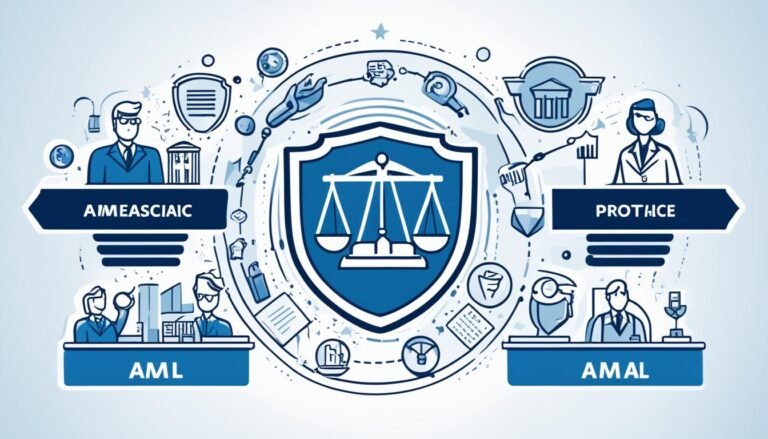KYC Regulations: Essential Compliance Insights
Did you know that money laundering accounts for approximately 2-5% of global GDP, which amounts to trillions of dollars annually?
Financial crimes like money laundering pose significant risks to the global economy. To combat these illicit activities, KYC regulations have become essential for financial institutions worldwide. KYC, which stands for Know Your Customer, refers to the process of verifying the identity of customers and assessing their risk levels to prevent financial crimes.
In this article, we will explore the importance of KYC compliance, the evolution of KYC regulations, key elements of KYC requirements, the role of technology in KYC compliance, challenges faced by organizations in implementing KYC compliance, consequences of non-compliance with KYC regulations, best practices for KYC compliance, the future of KYC compliance in the financial industry, and global KYC regulations and compliance.
Key Takeaways:
- Money laundering accounts for a significant portion of the global GDP.
- KYC regulations are crucial for financial institutions to prevent financial crimes.
- KYC compliance involves verifying customer identity and assessing their risk levels.
- Technology plays a vital role in streamlining KYC compliance processes.
- Non-compliance with KYC regulations can lead to severe financial and reputational consequences.
The Importance of KYC Compliance
KYC compliance plays a vital role in ensuring the security of financial institutions and mitigating the risks posed by financial crimes such as money laundering, terrorist financing, and fraud. By implementing robust Know Your Customer (KYC) processes, institutions can establish a strong foundation of trust, comply with regulatory requirements, and safeguard their operations and reputation.
At the heart of KYC compliance is the verification of customer identity. Financial institutions must diligently validate the identities of their customers, gathering accurate and up-to-date information to establish a reliable and traceable relationship. This process enables institutions to better understand customer behavior, transactions, and risk levels – key elements in the prevention of financial crimes. KYC compliance not only protects the institution itself, but also creates a secure environment for customers, fostering trust and confidence in the financial system.
Compliance regulations require institutions to implement comprehensive KYC procedures that encompass initial customer identification, ongoing monitoring, and risk assessment. These measures act as safeguards against illicit activities, providing a defense against money laundering, terrorist financing, and fraud attempts. By staying abreast of evolving compliance regulations and strengthening their KYC protocols, institutions can maintain a proactive stance against financial crimes and ensure compliance with industry standards.
“KYC compliance is fundamental to establishing trust in the financial sector by safeguarding against financial crimes and associated risks.”
Utilizing modern technologies further enhances KYC compliance by streamlining processes, reducing manual errors, and improving efficiency. Automated identity verification solutions, such as biometric identification and customer due diligence software, enable institutions to validate customer identities in real-time and track transactional activities more effectively. These technological advancements contribute to a more robust and dynamic KYC framework.
Financial institutions must recognize the criticality of KYC compliance and actively work towards establishing a culture of vigilance and awareness. Compliance training programs for employees, regular audits, and proactive monitoring of compliance activities are vital aspects of an effective KYC compliance strategy. By embracing these best practices, financial institutions demonstrate a commitment to preventing financial crimes, protecting their stakeholders, and upholding the integrity of the financial system.
Proactive Compliance: Case Study
In a recent study conducted by a leading financial institution, it was found that institutions that prioritize KYC compliance and invest in robust compliance practices experience significant reductions in financial crimes. The study examined the correlation between compliance efforts and instances of fraud, money laundering, and terrorist financing.
The results were striking, with institutions that implemented proactive KYC compliance programs observing a 50% decrease in instances of financial crimes compared to those with less comprehensive compliance measures. The study highlighted the direct link between robust KYC compliance and the prevention of financial crimes, reinforcing the importance of a proactive approach in safeguarding the financial industry.
Illustrative Example: Financial Crimes Prevented Through KYC Compliance Efforts
To understand the tangible impact of KYC compliance in preventing financial crimes, consider the following example:
| Date | Financial Institution | Type of Crime | Outcome |
|---|---|---|---|
| June 5, 2021 | ABC Bank | Money Laundering | The KYC compliance team at ABC Bank identified suspicious transactions and promptly reported them to the relevant authorities. The authorities launched an investigation, resulting in the arrest of individuals involved in an international money laundering ring. |
| October 12, 2021 | XYZ Credit Union | Fraud | Through diligent KYC compliance processes, XYZ Credit Union detected fraudulent account activity and took immediate action to freeze the accounts and notify law enforcement. The investigation led to the apprehension of several individuals engaged in a large-scale fraud operation. |
| December 23, 2021 | 123 Investment Firm | Terrorist Financing | 123 Investment Firm’s KYC compliance protocols identified suspicious transactions linked to known terrorist organizations. The firm quickly reported the activities to the appropriate authorities, helping thwart potential acts of terrorism. |
These real-world examples demonstrate the significant role that KYC compliance plays in preventing financial crimes, protecting the integrity of the financial system, and promoting global security.
As regulatory frameworks evolve and financial crimes become increasingly sophisticated, the importance of KYC compliance cannot be overstated. Institutions that prioritize KYC compliance establish themselves as trusted entities within the financial industry, gaining a competitive edge and protecting themselves and their customers from potential threats. By understanding the vital role KYC compliance plays in preventing financial crimes, institutions can proactively adapt their strategies, safeguard their operations, and contribute to a secure financial landscape.
The Evolution of KYC Regulations
KYC regulations have undergone significant changes to keep up with the evolving landscape of financial crimes. The Financial Crimes Enforcement Network (FinCEN) has played a crucial role in introducing and enforcing these regulations in the United States and beyond.
One key regulation that has had a profound impact on KYC compliance is the Bank Secrecy Act (BSA). Enacted in 1970, the BSA has been instrumental in combating money laundering and other financial crimes. It requires financial institutions to establish effective Anti-Money Laundering (AML) programs and implement Customer Due Diligence (CDD) measures to verify the identity of their customers.
The USA PATRIOT Act, passed in response to the 9/11 attacks in 2001, further strengthened KYC regulations. It expanded the scope of KYC compliance by requiring financial institutions to enhance their due diligence processes, monitor transactions more closely, and report suspicious activities to authorities.
The Dodd-Frank Wall Street Reform and Consumer Protection Act of 2010 also made significant contributions to KYC regulations. This legislation aimed to prevent another financial crisis and introduced regulatory frameworks to enhance transparency, accountability, and customer protection in the financial industry.
Over time, KYC regulations have become more strict and sophisticated, offering better protection against financial crimes such as money laundering and terrorist financing. These regulations require financial institutions to conduct thorough customer identification, risk assessment, ongoing monitoring, and employee training to detect and prevent illicit activities.
“KYC regulations have continuously evolved to address emerging threats and stay ahead of financial criminals. The introduction of regulatory frameworks and the strengthening of compliance requirements have played a crucial role in safeguarding the integrity of the financial system.”
Complying with KYC regulations not only helps prevent money laundering and terrorist financing but also ensures the stability and integrity of the financial industry. The ongoing efforts by regulatory bodies and financial institutions to combat financial crimes are crucial in maintaining trust and confidence in the global financial system.
| Regulation | Description |
|---|---|
| Bank Secrecy Act (BSA) | An act enacted in 1970 to combat money laundering by requiring financial institutions to establish AML programs and implement CDD measures. |
| USA PATRIOT Act | A legislation passed in response to the 9/11 attacks, which expanded KYC compliance requirements, enhanced due diligence, and increased transaction monitoring and reporting. |
| Dodd-Frank Wall Street Reform | A 2010 act that introduced regulatory frameworks to enhance transparency, accountability, and customer protection in the financial industry. |
Key Elements of KYC Requirements
KYC requirements encompass various essential elements that financial institutions must adhere to in order to comply with regulations and prevent financial crimes. These elements form the foundation of a comprehensive Customer Identification Program (CIP) that ensures the verification of customer identities, assesses customer risk through Customer Due Diligence (CDD), and focuses on high-risk customers through Enhanced Due Diligence (EDD). In addition, risk assessment and ongoing monitoring play crucial roles in maintaining compliance and identifying potentially suspicious activities. To ensure the effective implementation of KYC requirements, financial institutions must also prioritize training programs to equip their employees with the necessary knowledge and skills.
Key Elements of KYC Requirements:
- Customer Identification Program (CIP): Verifies the identity of customers, ensuring that they are who they claim to be.
- Customer Due Diligence (CDD): Assesses and understands the level of risk associated with each customer to prevent potential financial crimes.
- Enhanced Due Diligence (EDD): Focuses on high-risk customers who pose a greater threat of involvement in illegal activities.
- Risk Assessment: Evaluates the level of risk posed by customers and their transactions based on various factors such as transaction history, geographical location, and industry.
- Ongoing Monitoring: Continuously monitors customer activities to detect and address any suspicious or unusual behavior.
- Training: Provides comprehensive and regular training programs to employees to ensure they are knowledgeable about KYC regulations and can effectively perform their compliance-related duties.
By implementing these key elements, financial institutions can establish robust KYC processes that align with regulatory requirements and minimize the risk of financial crimes.
Effective KYC compliance requires the integration of various elements, from verifying customer identities to continuously monitoring their activities. By prioritizing risk assessment, ongoing monitoring, and employee training, financial institutions can mitigate the risk of financial crimes and maintain compliance with KYC requirements.
| Key Elements of KYC Requirements | Description |
|---|---|
| Customer Identification Program (CIP) | Verifies the identity of customers, ensuring their authenticity. |
| Customer Due Diligence (CDD) | Assesses and understands customer risk to prevent financial crimes. |
| Enhanced Due Diligence (EDD) | Focuses on high-risk customers who pose a greater threat. |
| Risk Assessment | Evaluates the level of risk associated with customers and their transactions. |
| Ongoing Monitoring | Continuously monitors customer activities to detect suspicious behavior. |
| Training | Provides comprehensive and regular training programs to employees. |
The Role of Technology in KYC Compliance
Technology plays a crucial role in ensuring KYC compliance, making the process more efficient and effective for financial institutions. By leveraging advanced technological solutions, businesses can streamline identity verification and customer due diligence processes, thereby reducing manual efforts and costs. Let’s explore some of the key technological innovations driving KYC compliance:
1. Identity Verification
Identity verification is a critical component of KYC compliance, and technology facilitates the process by enabling biometric identification. Facial recognition technology, for example, allows for quick and accurate verification of customer identities, enhancing security measures and minimizing the risk of fraudulent activities.
2. Customer Due Diligence Software
Customer due diligence is a comprehensive process that involves assessing customer risks and verifying their identities. With the help of specialized software, financial institutions can automate KYC compliance processes, reducing the need for manual review and ensuring consistent adherence to regulatory requirements.
3. Automated Processes
Automation plays a crucial role in streamlining KYC compliance efforts. Automated processes enable the collection, analysis, and storage of customer data in a more efficient and secure manner. By automating routine tasks, financial institutions can focus their resources on higher-risk assessments and strategic decision-making.
“The integration of technology in KYC compliance enhances the ability of financial institutions to meet regulatory requirements while ensuring a seamless customer experience.” – [Expert Name], [Institution Name]
In conclusion, technology has revolutionized the way financial institutions approach KYC compliance. Through the use of biometric identification, customer due diligence software, and automated processes, businesses can enhance their compliance efforts, minimize manual intervention, and provide a more secure and efficient customer experience.
Challenges Faced by Organizations in Implementing KYC Compliance
Implementing KYC compliance can pose several challenges for organizations within the financial industry. These challenges revolve around regulatory complexity, data management, resource allocation, and compliance costs.
Regulatory Complexity: Keeping up with the constantly evolving KYC regulations can be demanding for organizations. Compliance requirements may vary across jurisdictions, making it essential for businesses to stay updated and navigate through complex regulatory frameworks.
Data Management: Managing vast amounts of customer data is a significant challenge for organizations implementing KYC compliance. Ensuring the accuracy, security, and accessibility of customer information while adhering to data protection regulations can be a complex and resource-intensive task.
Resource Allocation: Allocating sufficient resources to meet KYC compliance obligations is crucial. Organizations need to invest in skilled personnel, innovative technology, and robust processes to effectively carry out customer due diligence, risk assessments, and ongoing monitoring.
Compliance Costs: Achieving and maintaining KYC compliance can be financially burdensome for organizations. The costs associated with implementing advanced technology solutions, training programs, audits, and overall compliance efforts can strain budgets and impact the bottom line.
Overcoming these challenges requires a strategic approach that integrates regulatory intelligence, efficient data management systems, optimal resource allocation, and cost-effective compliance practices. By addressing these hurdles, organizations can ensure the successful implementation of KYC compliance protocols and enhance their overall risk management framework.
Streamlining KYC Compliance with Technology Solutions
Technology plays a vital role in streamlining KYC compliance processes and addressing the challenges faced by organizations. By leveraging innovative solutions such as customer due diligence software, automated data analysis tools, and artificial intelligence-powered identity verification systems, businesses can enhance efficiency, accuracy, and cost-effectiveness in their compliance efforts.
Automated systems can help streamline the collection, analysis, and verification of customer data, significantly reducing the time and resources required for manual processing. By adopting robust technology solutions, organizations can improve data management practices, ensure regulatory compliance, and mitigate the risks associated with non-compliance.
Furthermore, technology solutions enable organizations to stay updated with changing regulatory requirements, ensuring a proactive approach to compliance and reducing the risk of penalties or reputational damage.
Consequences of Non-Compliance with KYC Regulations
Non-compliance with KYC regulations can have serious repercussions for financial institutions, ranging from significant financial penalties and legal consequences to reputational damage. Failing to adhere to KYC requirements exposes businesses to heightened risks, including fraud, money laundering, and other financial crimes.
Financial penalties are one of the immediate consequences of non-compliance with KYC regulations. Regulatory bodies and authorities impose substantial fines on institutions that neglect their KYC obligations. These financial penalties can have a crippling effect on the bottom line, potentially leading to financial instability and business disruption.
Legal consequences are another result of non-compliance with KYC regulations. Regulatory authorities have the power to file lawsuits and take legal action against organizations that fail to meet their KYC requirements. Legal cases can be lengthy, expensive, and damaging to a company’s reputation, further exacerbating the consequences of non-compliance.
Reputational damage is one of the most significant long-term repercussions of KYC non-compliance. News of a financial institution’s failure to comply with KYC regulations can spread quickly, eroding customer trust and confidence. Reputational damage can tarnish a company’s brand, leading to a loss of customers, partners, and investors. Restoring a damaged reputation can be a difficult and time-consuming process.
Non-compliance with KYC regulations can result in severe consequences for financial institutions, including significant financial penalties, legal actions, and reputational damage.
Financial institutions must prioritize KYC compliance to avoid these negative outcomes. By implementing robust KYC procedures, conducting regular audits, and providing comprehensive training programs, organizations can mitigate the risks associated with non-compliance. Embracing technology and automation can streamline KYC processes, making compliance more efficient and effective.
Ensuring compliance with KYC regulations is not just a matter of meeting legal requirements; it is an essential element of risk management. By proactively preventing financial crimes through KYC compliance, financial institutions protect themselves, their customers, and the integrity of the financial system as a whole.
BENEFITS OF KYC COMPLIANCE
1. **Risk mitigation:** KYC compliance helps financial institutions identify and assess potential risks associated with their customers, transactions, and business relationships, allowing them to implement appropriate risk management strategies.
2. **Customer protection:** By conducting due diligence and verifying customer identities, financial institutions protect their customers from fraud, identity theft, and other forms of financial abuse.
3. **Protecting the financial system:** KYC compliance plays a crucial role in maintaining the integrity of the global financial system by preventing money laundering, terrorist financing, and other illicit activities.
4. **Enhanced reputation:** By demonstrating a commitment to KYC compliance, financial institutions enhance their reputation as trustworthy and reliable partners, attracting customers and business opportunities.
Best Practices for KYC Compliance
In order to maintain effective KYC compliance, financial institutions should follow a set of best practices. These guidelines ensure that robust procedures are in place, regular audits are conducted, comprehensive training programs are provided, and compliance monitoring remains a priority.
Implementing Robust Procedures
One of the key best practices for KYC compliance is to establish robust procedures. This involves creating a well-defined and documented process that covers all aspects of customer identification, due diligence, and risk assessment. By implementing these procedures, financial institutions can ensure that every customer is accurately verified and their risk profile is thoroughly assessed.
Conducting Regular Audits
Regular internal and external audits are essential for maintaining KYC compliance. These audits help identify any gaps or weaknesses in the compliance program, ensuring that necessary improvements are made. Furthermore, audits provide an opportunity to assess the effectiveness of existing procedures and make adjustments as needed.
Providing Comprehensive Training Programs
Comprehensive training programs are crucial for ensuring that employees have a deep understanding of KYC compliance requirements. Training should cover topics such as customer identification, due diligence procedures, risk assessment techniques, and regulatory guidelines. By investing in training programs, financial institutions can equip their employees with the necessary knowledge and skills to effectively carry out KYC procedures.
Maintaining Ongoing Compliance Monitoring
Compliance monitoring should be an ongoing process to ensure adherence to KYC requirements. This involves regularly reviewing customer data, transactions, and risk profiles to identify any suspicious or unusual activities. By continuously monitoring compliance, financial institutions can promptly detect and address any potential compliance breaches.
By following these best practices, financial institutions can enhance their KYC compliance efforts, mitigate risk, and protect themselves from potential regulatory penalties and reputational damage.
| Key Best Practices for KYC Compliance | Benefits |
|---|---|
| Implementing robust procedures | Ensures accurate customer verification and risk assessment |
| Conducting regular audits | Identifies gaps in compliance and allows for necessary improvements |
| Providing comprehensive training programs | Equips employees with the necessary knowledge and skills |
| Maintaining ongoing compliance monitoring | Prompts prompt detection and resolution of compliance breaches |
Future of KYC Compliance in the Financial Industry
The future of KYC compliance in the financial industry is poised for significant transformation driven by technological advancements and automation. As financial institutions strive to enhance efficiency and streamline compliance efforts, automation will play a pivotal role in meeting KYC requirements.
Technological advancements will revolutionize the way KYC compliance is conducted. With the rapid progress in identity verification technologies, such as biometric identification, financial institutions will be able to verify customer identities more accurately and efficiently. Facial recognition technology, for example, will enable seamless and secure customer authentication.
Automation will enable financial institutions to automate repetitive and manual KYC processes, freeing up valuable resources and reducing operational costs. Customer due diligence software will provide a robust solution for automating tasks, such as data collection and risk assessment. This will not only accelerate the compliance process but also improve accuracy and consistency in meeting regulatory requirements.
A risk-based approach will continue to evolve in KYC compliance. By adopting a risk-based approach, financial institutions can allocate resources based on customer risk levels. This approach allows institutions to prioritize higher-risk customers and transactions, resulting in more targeted compliance efforts and enhanced risk management.
“Technological advancements and automation will shape the future of KYC compliance in the financial industry, providing opportunities for financial institutions to improve efficiency, accuracy, and risk management.”
Benefits of Future KYC Compliance
The future of KYC compliance holds several benefits for financial institutions:
- Enhanced Efficiency: Automation of KYC processes will streamline compliance efforts, reducing the time and resources required for manual tasks.
- Improved Accuracy: Technological advancements like biometric identification will enhance the accuracy of customer identification, reducing the risk of fraudulent activities.
- Cost Savings: Automation will enable financial institutions to reduce operational costs associated with manual KYC processes, resulting in significant savings.
- Better Risk Management: The risk-based approach will enable financial institutions to allocate resources effectively and focus on higher-risk customers, improving overall risk management.
Challenges and Considerations
While the future of KYC compliance brings promising advancements, financial institutions should also be mindful of the challenges and considerations they may encounter:
- Technological Integration: Implementing new technologies and automation may require significant investments in infrastructure and training.
- Data Security: As financial institutions rely more on automated processes, ensuring robust data security measures becomes crucial in safeguarding sensitive customer information.
- Regulatory Compliance: Financial institutions must stay up-to-date with evolving regulations and ensure that their automated systems comply with the latest KYC requirements.
As the financial industry embraces technological advancements and automation, the future of KYC compliance holds immense potential in revolutionizing the way financial institutions manage customer due diligence and meet regulatory obligations. By leveraging these advancements, institutions can improve efficiency, accuracy, and risk management, ultimately providing a better experience for customers while maintaining compliance.
Global KYC Regulations and Compliance
KYC regulations are not limited to the United States. Countries worldwide have implemented their own KYC regulations, often in line with the recommendations of the Financial Action Task Force (FATF). International compliance requires financial institutions to adhere to the varying Anti-Money Laundering (AML) laws and undergo due diligence and risk assessments on a global scale.
By establishing global KYC regulations, countries aim to prevent money laundering, terrorist financing, and other financial crimes that can have far-reaching consequences. These regulations ensure that financial institutions operating internationally have a consistent and standardized approach to customer identification, due diligence, risk assessment, and ongoing monitoring.
The FATF plays a significant role in shaping global KYC compliance. It is an intergovernmental organization that sets international standards and promotes the implementation of effective AML and counter-terrorist financing measures. Its recommendations provide guidance to countries on developing their own KYC regulations, enabling a more unified and coordinated global effort in fighting financial crimes.
Financial institutions operating globally must navigate the complexities of complying with various AML laws and regulations across jurisdictions. This involves conducting due diligence on customers, understanding their risk profiles, and implementing appropriate risk mitigation measures. It also requires the establishment of robust systems and processes that facilitate compliance with different regulatory frameworks.
Effective global KYC compliance requires financial institutions to stay updated with the evolving regulatory landscape and employ advanced technologies to streamline their compliance efforts. Automated identity verification and risk assessment solutions, powered by artificial intelligence, can help financial institutions efficiently and accurately identify and assess risks associated with their customers.
By embracing global KYC regulations and prioritizing compliance, financial institutions can contribute to a safer and more transparent global financial system. Compliance with AML laws and regulations not only protects financial institutions from legal and reputational risks but also fosters trust and confidence among customers and stakeholders.
As the world becomes increasingly interconnected, global KYC regulations and compliance will continue to play a vital role in safeguarding the integrity of the financial industry and preventing illicit activities.
The Importance of Global KYC Compliance:
“Global KYC compliance ensures that financial institutions can effectively combat money laundering, terrorist financing, and other financial crimes across borders. By adhering to international standards and regulations, these institutions contribute to a more secure and trustworthy global financial system.”
Conclusion
In conclusion, KYC compliance is of utmost importance for financial institutions to effectively manage risks and prevent financial crimes. By prioritizing KYC compliance, these institutions can safeguard themselves from potential legal and reputational risks.
Understanding the significance of KYC compliance is the first step towards establishing robust procedures and processes. By carrying out thorough customer due diligence, conducting risk assessments, and implementing ongoing monitoring, financial institutions can ensure regulatory compliance and effectively prevent the occurrence of financial crimes.
Leveraging technology is also crucial in achieving KYC compliance. The use of advanced identity verification solutions, such as biometric identification, can help streamline the identification process and enhance accuracy. Additionally, implementing automated processes, such as customer due diligence software, can greatly enhance the efficiency of compliance efforts.
By adhering to KYC regulations, financial institutions demonstrate their commitment to risk management and the prevention of financial crimes. Implementing best practices and staying up-to-date with evolving regulatory frameworks will ensure that these institutions can safeguard their operations, protect their customers, and contribute to a safer financial industry.







